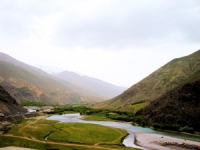Water sharing between Central Asian countries has been conflicting for quite a long time already.
World Bank continues supporting food security in rural Tajikistan

DUSHANBE, February 5, 2013, Asia-Plus -- A grant agreement to finance the Second Tajikistan Public Employment for Sustainable Agriculture and Water Resources Management Project was signed today in Dushanbe by the Minister of Finance of Tajikistan Safarali Najmiddinov and the World Bank Country Manager in Tajikistan, Marsha Olive.
This project with a goal of improving agricultural production and creating temporary employment in Tajikistan will allow scaling up of a successfully completed first project, which benefitted over 43,000 households in Khatlon region through income transfers and improved access to irrigation.
The new project is being financed through a US$18 million grant from the International Development Association (IDA) and a US$ 27.9 million grant from the Global Agriculture and Food Security Multi-Donor Trust Fund Program. The World Bank Board of Executive Directors approved this financing, a total of US$45.9 million in November 2012. The new project aims to benefit over 770,000 people residing in twelve districts of the southern Khatlon region of Tajikistan through temporary public employment opportunities and rehabilitation of important irrigation and drainage infrastructure.
“I am glad to see this project expanding and covering new districts of Tajikistan as food security is essential for the well-being of children and adults everywhere,” said Marsha Olive, World Bank Country Manager for Tajikistan. “By providing temporary employment opportunities we intend to help rural households not only earn additional income, but improve access to irrigation so they could get higher crop yields from their land in many years to come.”
The food price volatility remains a concern for the country as it poses additional risks to individuals and families in rural areas, in particular. Given that expenditures on food absorb more than half of household budgets in Tajikistan, the project aims to provide much needed support to rural families and directly benefit an estimated 22,000 people through the provision of temporary work only.
Najmiddinov noted that the rehabilitation of irrigation and drainage infrastructure would improve access to irrigation for about 190,000 hectares of land to the benefit of 750,000 rural residents. A 10 percent increase in crop yields is expected as a result of the project.
According to him, the project will cover Yovon, Khuroson, Bokhtar, Jilikul, Vose, Hamadoni, Panj, Nosiri Khusrav, Rumi, Hisor and Roudaki districts.
The project will also support ongoing institutional and policy reform in water resource management. Around 20 new Water User Associations (WUA) will be established and capacity building will be provided to these and existing 33 WUAs in project areas.
The original project, financed through the European Union Food Crises Rapid Response Facility, in the amount of US$ 10.01 million was launched in 2010.
According to press release issued by the World Bank Dushanbe Office, the project helped employ 10,590 people in five vulnerable districts of Khatlon region, namely Farkhor, Qumsangir, Qabodyon, Shahritous and Vakhsh. Each person generated a net income of US$ 230, while improving access to 44,276 hectares of irrigated arable land. These resulted in at least 5 percent increase of agricultural production of rice, vegetables, potatoes, and wheat in targeted districts.
The active portfolio of the World Bank in Tajikistan currently consists of 15 projects with a net commitment of around US$ 252.8 million. The largest share of the portfolio is in agriculture and rural development (27 percent), followed by energy (24 percent), water and sanitation (18 percent), human development – education, health and social protection (24 percent), the private sector (4 percent) and the public sector (2 percent).




